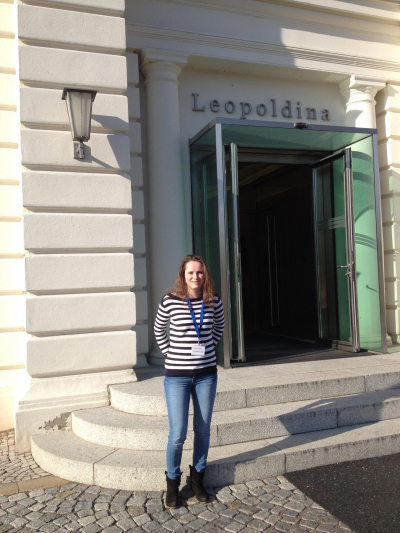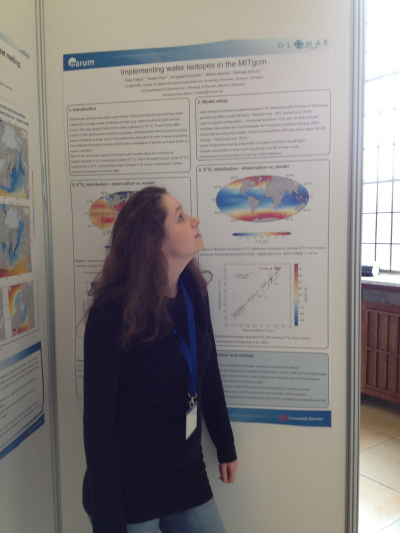Die Inhalte dieser Seite sind leider nicht auf Deutsch verfügbar.
Seitenpfad:
Rike Voelpel
Report of GLOMAR PhD student Rike Voelpel about her participation in the Leopoldina Symposium on “Deglacial Changes in Ocean Dynamics and Atmospheric CO2" in Halle (Saale), Germany from 18 - 21 March 2015
First of all I would like to thank GLOMAR and the German National Academy of Sciences Leopoldina for the financial support to participate in the Leopoldina Symposium on “Deglacial Changes in Ocean Dynamics and Atmospheric CO2 – Modern, glacial, and deglacial carbon transfer between ocean, atmosphere and land”.
The symposium took place in Halle (Saale) from 18 – 21.03.2015 and combined numerous oral and poster presentations evaluating new empiric and model-based findings on deglacial changes.
Within my PhD project I am implementing water isotopes in an ocean general circulation model to investigate present and past states of ocean circulation. In particular I am interested in the effect of freshwater on the Atlantic Meridional Overturning Circulation during the last deglaciation (20 ka to 10 ka). In this regard the symposium was very helpful to get a complete overview of the latest findings about the key processes within the last deglaciation. Around 90 participants from all over the world contributed 50 oral presentations, which covered not only the ocean aspect within the climate system but also the atmosphere, terrestrial biosphere and soils. It nicely demonstrated that the climate change during the last deglaciation is the result of an interaction of many climate components and that one has always to keep in mind the big picture. I got aware of a lot of interesting publications, that will help me as soon as I will start my model simulation for the last deglaciation.
Furthermore, the symposium gave young scientists (including me) a unique opportunity to present their work in form of a poster during three different sessions (two hours each). In this way, I was able to have lively and fruitful discussions about my current work with a number of experienced scientists.
In general, participating in the Leopoldina Symposium gave me a great opportunity to deepen my understanding and knowledge about the last deglaciation. Furthermore, I was able to present my own research to the scientific community whereby I got new ideas from renowned scientists. So overall, the participation in the symposium was highly beneficial in both personal and scientific respect.
The symposium took place in Halle (Saale) from 18 – 21.03.2015 and combined numerous oral and poster presentations evaluating new empiric and model-based findings on deglacial changes.
Within my PhD project I am implementing water isotopes in an ocean general circulation model to investigate present and past states of ocean circulation. In particular I am interested in the effect of freshwater on the Atlantic Meridional Overturning Circulation during the last deglaciation (20 ka to 10 ka). In this regard the symposium was very helpful to get a complete overview of the latest findings about the key processes within the last deglaciation. Around 90 participants from all over the world contributed 50 oral presentations, which covered not only the ocean aspect within the climate system but also the atmosphere, terrestrial biosphere and soils. It nicely demonstrated that the climate change during the last deglaciation is the result of an interaction of many climate components and that one has always to keep in mind the big picture. I got aware of a lot of interesting publications, that will help me as soon as I will start my model simulation for the last deglaciation.
Furthermore, the symposium gave young scientists (including me) a unique opportunity to present their work in form of a poster during three different sessions (two hours each). In this way, I was able to have lively and fruitful discussions about my current work with a number of experienced scientists.
In general, participating in the Leopoldina Symposium gave me a great opportunity to deepen my understanding and knowledge about the last deglaciation. Furthermore, I was able to present my own research to the scientific community whereby I got new ideas from renowned scientists. So overall, the participation in the symposium was highly beneficial in both personal and scientific respect.




